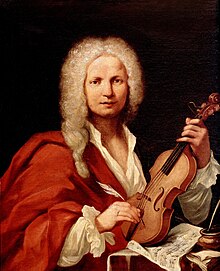
Back Antonio Vivaldi Afrikaans Antonio Vivaldi ALS አንቶኒዮ ቪቫልዲ Amharic Antonio Vivaldi AN أنطونيو فيفالدي Arabic انتونيو ڤيڤالدى ARZ Antonio Vivaldi AST Antonio Vivaldi Aymara Antonio Vivaldi Azerbaijani آنتونیو ویوالدی AZB
Antonio Vivaldi | |
|---|---|
 Probable portrait of Vivaldi, c. 1723[n 1] | |
| Born | 4 March 1678 |
| Died | 28 July 1741 (aged 63) |
| Signature | |
Antonio Lucio Vivaldi[n 2] (4 March 1678 – 28 July 1741) was an Italian composer, virtuoso violinist and impresario of Baroque music.[4] Along with Johann Sebastian Bach and George Frideric Handel, Vivaldi ranks amongst the greatest Baroque composers and his influence during his lifetime was widespread across Europe, giving origin to many imitators and admirers. He pioneered many developments in orchestration, violin technique and programmatic music.[5] He consolidated the emerging concerto form into a widely accepted and followed idiom.
Vivaldi composed many instrumental concertos, for the violin and a variety of other musical instruments, as well as sacred choral works and more than fifty operas. His best-known work is a series of violin concertos known as The Four Seasons. Many of his compositions were written for the all-female music ensemble of the Ospedale della Pietà, a home for abandoned children. Vivaldi began studying for the priesthood at the age of 15 and was ordained at 25, but was given dispensation to no longer say public Masses due to a health problem.[6] Vivaldi also had some success with expensive stagings of his operas in Venice, Mantua and Vienna. After meeting the Emperor Charles VI, Vivaldi moved to Vienna, hoping for royal support. However, the Emperor died soon after Vivaldi's arrival, and Vivaldi himself died in poverty less than a year later.
After almost two centuries of decline, Vivaldi's musical reputation underwent a revival in the early 20th century, with much scholarly research devoted to his work. Many of Vivaldi's compositions, once thought lost, have been rediscovered – some as recently as 2015.[7] His music remains widely popular in the present day and is regularly played all over the world.
Cite error: There are <ref group=n> tags on this page, but the references will not show without a {{reflist|group=n}} template (see the help page).
- ^ Wells, John C. (2008). Longman Pronunciation Dictionary (3rd ed.). Longman. ISBN 978-1-4058-8118-0.
- ^ Roach, Peter (2011). Cambridge English Pronouncing Dictionary (18th ed.). Cambridge: Cambridge University Press. ISBN 978-0-521-15253-2.
- ^ "Vivaldi, Antonio" (US) and "Vivaldi, Antonio". Lexico UK English Dictionary. Oxford University Press. Archived from the original on 5 November 2021.
- ^ Talbot, Porter & Knapp 2022, § "Introduction".
- ^ Talbot & Lockey 2020.
- ^ "The Italian composer Vivaldi was also a Catholic priest". 9 November 2018.
- ^ New Discoveries of Vivaldi. Scaramuccia Ensemble. Retrieved 27 October 2023.